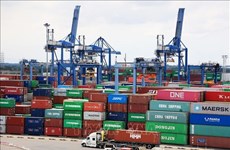Software giant FPT posts rising revenue
Vietnam's software giant FPT announced
yesterday that it had posted a revenue of 4.27 trillion VND (224
million USD) in the first quarter this year, an increase of 8.7 percent
over the same period last year.
Vietnam's software giant FPT announced
yesterday that it had posted a revenue of 4.27 trillion VND (224
million USD) in the first quarter this year, an increase of 8.7 percent
over the same period last year.
The group earned a pre-tax profit of 455 billion VND (23.9 million USD), 157 percent of its plan, 16.2 percent increase over the same period last year.
Deputy general director Le Trung Thanh said after-tax profit of the parent company reached 290 billion VND (15.2 million USD), representing an increase of 32.1 percent against the same period last year.
Thanh said earning-per-share was 2,021 VND (0.1 USD), progressing 29.8 percent against the same period last year.
The performance in the first quarter was attributed to improvements in software exports, distribution, training, telecoms and integrated system services.
In the distribution sector, the group focused on distributing high added-value products by expanding its range of hi-tech products such as personal computers, laptops and mobile phones and network equipment. By the end of the first quarter, the distribution sector earned a revenue of 3.11 trillion VND (163 million USD) making a profit of more than 150 billion VND (7.8 million USD). In the telecoms sector, the group continued to increase its coverage to 31 cities and provinces.
In the software sector, the group expands its market to other countries. Accordingly, revenue from the US and EU markets reached a growth rate of 81 percent and 86 percent respectively.
The integrated system sector saw a slow start in the first quarter, prolonging hardware supply projects. However, Thanh believed signed contracts would lift business performance for the rest of the year.
The group's shareholders have approved a 58.3 percent dividend on last year's profits, of which a 25 percent cash dividend has already been paid. The remainder would be paid in shares before June 30 this year.
The group also plans to offer bonus shares this year at a ratio of 4:1, as well as pay a dividend on this year's profits of at least 15 percent.
The group continues to pursue the "e-Citizens" strategy, concentrating intensively on core businesses, appealing for synergy among member companies to introduce products and services./.
The group earned a pre-tax profit of 455 billion VND (23.9 million USD), 157 percent of its plan, 16.2 percent increase over the same period last year.
Deputy general director Le Trung Thanh said after-tax profit of the parent company reached 290 billion VND (15.2 million USD), representing an increase of 32.1 percent against the same period last year.
Thanh said earning-per-share was 2,021 VND (0.1 USD), progressing 29.8 percent against the same period last year.
The performance in the first quarter was attributed to improvements in software exports, distribution, training, telecoms and integrated system services.
In the distribution sector, the group focused on distributing high added-value products by expanding its range of hi-tech products such as personal computers, laptops and mobile phones and network equipment. By the end of the first quarter, the distribution sector earned a revenue of 3.11 trillion VND (163 million USD) making a profit of more than 150 billion VND (7.8 million USD). In the telecoms sector, the group continued to increase its coverage to 31 cities and provinces.
In the software sector, the group expands its market to other countries. Accordingly, revenue from the US and EU markets reached a growth rate of 81 percent and 86 percent respectively.
The integrated system sector saw a slow start in the first quarter, prolonging hardware supply projects. However, Thanh believed signed contracts would lift business performance for the rest of the year.
The group's shareholders have approved a 58.3 percent dividend on last year's profits, of which a 25 percent cash dividend has already been paid. The remainder would be paid in shares before June 30 this year.
The group also plans to offer bonus shares this year at a ratio of 4:1, as well as pay a dividend on this year's profits of at least 15 percent.
The group continues to pursue the "e-Citizens" strategy, concentrating intensively on core businesses, appealing for synergy among member companies to introduce products and services./.













